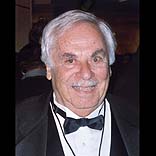 Anyone who ever met Armand Zildjian knew just how contagious his boundless enthusiasm and zest for life could be. To him music and fun were as inseparable as the copper and tin he himself fused together to create the bronze discs that brought that magical Zildjian sound to the world. But despite the serious weight of responsibility his birthright carried, Armand Zildjian wasn�t simply a businessman who made cymbals. He was a cymbal maker who turned his business into an art. He never lost sight that ultimately his job was making unique musical instruments, which brought joy to those who play or listen to music. Living life to its fullest and sharing that sense of joy and fun with his extended family and friends was what Armand Zildjian�s life was all about, and is, perhaps, his most important legacy.
Anyone who ever met Armand Zildjian knew just how contagious his boundless enthusiasm and zest for life could be. To him music and fun were as inseparable as the copper and tin he himself fused together to create the bronze discs that brought that magical Zildjian sound to the world. But despite the serious weight of responsibility his birthright carried, Armand Zildjian wasn�t simply a businessman who made cymbals. He was a cymbal maker who turned his business into an art. He never lost sight that ultimately his job was making unique musical instruments, which brought joy to those who play or listen to music. Living life to its fullest and sharing that sense of joy and fun with his extended family and friends was what Armand Zildjian�s life was all about, and is, perhaps, his most important legacy. © Drummerszone.com 2002-2024 Drummerszone.com is a Musicpublishers.nl website.
Oops, you're not logged in!
The more you like
the more you get!
